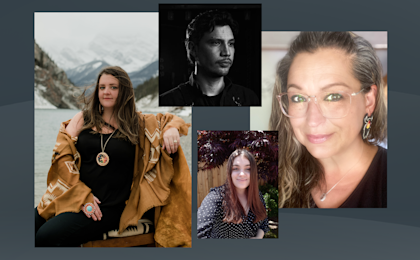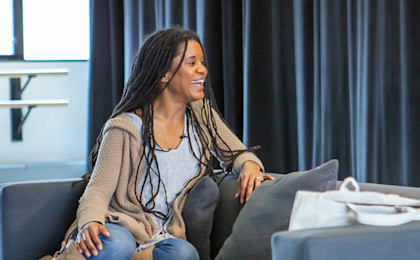For Emerging Talents, a Chance to Inspire Listeners Around the World
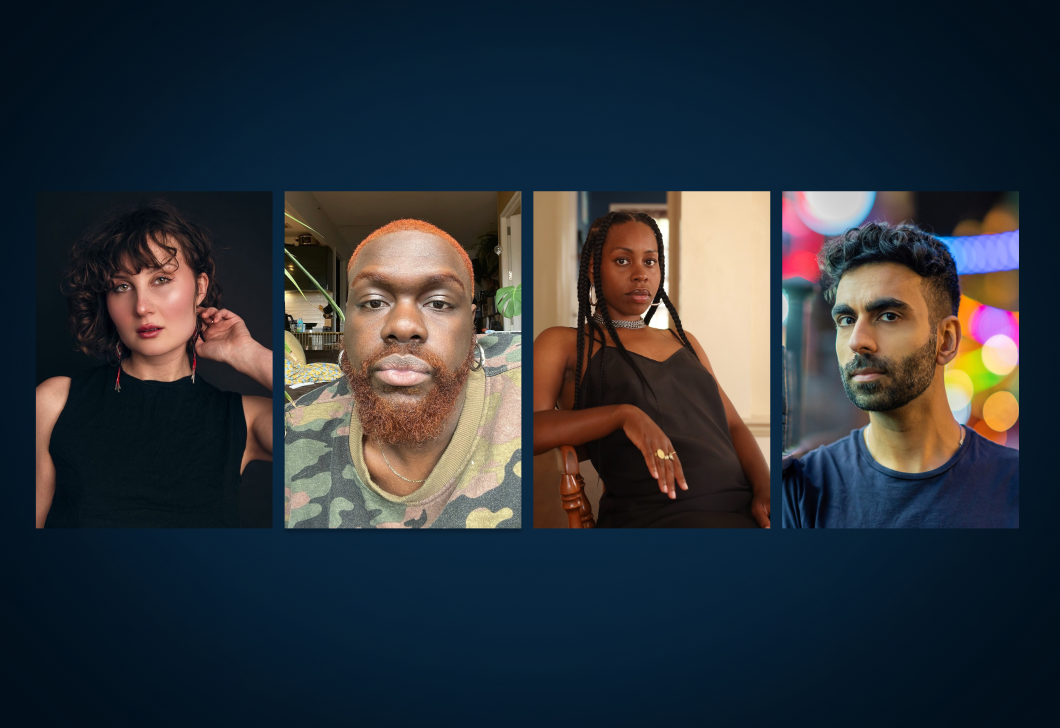
Best friends William Sinclair Moore and Paige Gilbert were sitting on the floor of their apartment, preparing to break a geode with a hammer and divide up the pieces. But first they had to decide what they wanted to manifest. They’d both come up in theater, and the idea of performing in something together appealed to them—then they hit on it: a podcast about the spiritual practices that had helped them and many others attract good things into their lives. They struck the geode (both swear they saw a spark) and each kept a piece of the crystal with them.
Whether by coincidence or manifestation, Moore heard about the Audible Podcast Development Program and applied on a whim. “I thought, ‘They’ll have so many people applying, it’s a long shot!’” he laughs. The program commissions and produces podcasts from emerging and undiscovered storytellers. Those accepted into the program receive $10,000, with all production costs covered, plus training; mentorship; support for scriptwriting, casting and production; and access to Audible’s state-of-the-art facilities and equipment.
The Audible Podcast Development Program is one of several programs, like the Audible Indigenous Writers' Circle and the Emerging Playwrights Fund, that create meaningful opportunities for storytellers while furthering Audible’s core commitment to producing and sharing powerful, boundary-pushing listening experiences.
Moore and Gilbert were thrilled to find themselves among the 10 people accepted (out of about 3,000 applicants) to the program’s first cohort. But for Kelley Sullivan, the program’s director, it was an obvious choice; she knew the duo had an important podcast in them. “I knew it was something incredibly unique that ought to be heard,” she says. “I could envision this bringing people of color into the dynamic nature of a healing community, a space that has not always felt welcoming to us.”
Over the next year, Audible’s production and content teams worked closely with Moore and Gilbert, and the cohort, to develop each podcast’s style and tone, guiding them on every aspect of audio storytelling, with the goal of creating a pilot episode. By the time they were finished, it was clear that Moore and Gilbert were ready for much more: Audible was so excited about their concept and talent that the podcast was greenlit for an entire first season. Executive producer Ann Heppermann worked closely with the pair to choose a team of producers and editors to bring the show to life. All the while, they received the benefit of Heppermann’s professional expertise, including reviewing and editing scripts, providing vocal coaching, and more.
On June 13, Sage the House Down: A Healing Pod was released on Audible. In the six episodes, Moore and Gilbert dive into different spiritual and healing practices, ranging from tarot reading to ancestor work to living with grief. The pair riff off each other easily, and their laughter and passion is infectious as they share their own experiences and interview guest experts. “We wanted to hear from diverse voices in the spirituality and wellness space—Black voices, queer voices, and anyone who we didn’t see at the forefront of the conversation,” says Moore. “What better way to make their voices heard—and share their wisdom with the world—than through audio.”
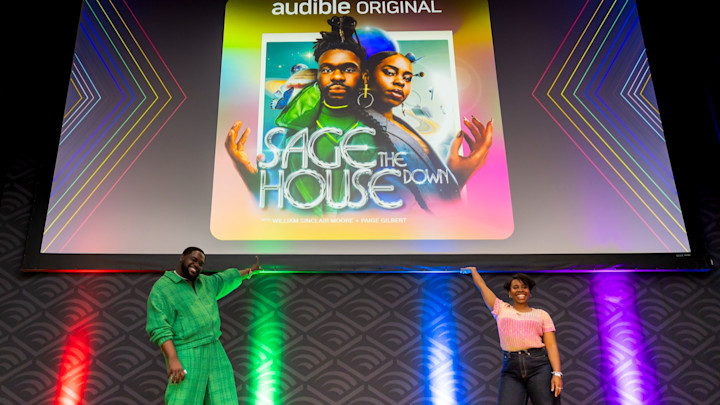
Gin Sexsmith is a writer and a member of the Mohawks of the Bay of Quinte First Nation, from Tyendinaga Mohawk Territory in Ontario, Canada. One night, she had a dream in which an elder was speaking Kanyen'ké:ha, her community’s native language, to a young crowd that was not listening to him. Sexsmith woke up and immediately began writing an essay about her experience inhabiting Mohawk and white worlds, which she submitted to Audible’s Indigenous Writers’ Circle (IWC) program.
The IWC, which launched in 2021, was conceived in collaboration with Vancouver-based social impact agency Yulu PR to create equitable access and opportunities for emerging First Nations, Inuit, and Métis writers in Canada, by matching them with an Indigenous mentor who is an established author and can offer guidance on everything from craft to agent representation and publishing.
Although she had already published a novel, Sexsmith says, “Writing can be so isolating, so I was excited about the opportunity to have a community that understands what it is to be both a writer and Indigenous.”
Sexsmith was accepted to the program’s third cohort and paired with Joshua Whitehead, an Oji-Cree, Two-Spirit writer whose work meant a great deal to her. “It was so inspiring for me, as an Indigiqueer person, to have an Indigiqueer mentor,” she says. “I feel more confident in my writing and my own identity after working with Josh.”
“Gin and Josh’s collaboration embodies the essence of our aspirations for the program,” says Georgia Knox, who has led the program for Audible since its inception. “By leveraging our resources and our connections to the creative community,” including accomplished writers like Whitehead, “the Audible Indigenous Writers’ Circle can provide unique opportunities for participants to tell their stories and support the next wave of Indigenous writers.”
While in the program, Sexsmith received exciting news: Audible wanted to produce the audio version of her first novel, In the Hands of Men. The sci-fi thriller, released June 20, stars Devery Jacobs (Reservation Dogs)—a casting choice that delighted Sexsmith. “They’re such a talent. They understand the intersectionality of not only being Mohawk but being queer as well,” she says, and the two became friendly over the course of recording. “I felt completely seen by them.”
Sexsmith was so buoyed by her experience in the IWC that she’s already writing a sequel to In the Hands of Men, as well as another sci-fi novel, both incorporating more Kanien'ké:ha language and culture.
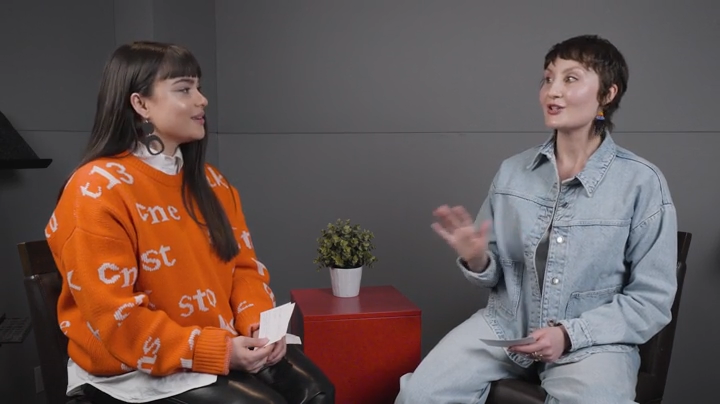
UK-based actor and writer Waleed Akhtar had already written acclaimed plays, appeared in feature films, and performed several audio titles when he found out he was accepted into the fourth cohort of Audible’s Emerging Playwrights Fund. The program, which has commissioned 50 works from up-and-coming playwrights in the UK, commissioned Akhtar to write an original drama for audio.
His previous works explored music television in Afghanistan, Kabul Goes Pop, and a queer Pakistani-British relationship, The P Word; this time, he decided to write from his experience as a working actor, but through the lens of an older female. “I really wanted to write something for women,” he explains. “Female actors aren’t offered a lot of parts after a certain age, and if you’re a woman of color that number becomes even smaller.”
Audible was “really supportive” of the idea, he says, and gave him the freedom to stay true to his vision as he wrote. Emilia LaPenta, director of the Emerging Playwrights Fund, says that although she has collaborative discussions with the writers, “Our commissions are technically open-ended, and we encourage writers to focus on a subject that most interests them. The goal is to find the sweet spot between an artist’s unique style and perspective, and our listeners’ interests and desires.”
Akhtar’s resulting play, Mrs. Bibi, centers on a British woman of South Asian descent as she navigates many identities: a liberated but exhausted working actress, the over-the-top “auntie” stereotype she portrays on TV, and the conflicted daughter of a dying mother with whom she had a complicated relationship.
Mrs. Bibi was recorded at Audible’s London studios and will be released in the first half of 2025. What Akhtar’s heard of it so far, “Everyone’s done such an amazing job. I’m so proud of it.” In September, his play The Real Ones is being performed at London’s world-famous Bush Theatre, and he’s adapting The P Word, which won London’s prestigious Olivier Award, for the screen.
The bespoke process we create in collaboration with each artist furthers Audible’s mission to be the destination of choice for creators. And the original work they create, produced to the highest quality, offers our listeners exactly what they expect from our brand: delightful stories and exceptional performances.
Says LaPenta, “By identifying promising, early-career artists, supporting their development, and producing their work, Audible is cultivating a generation of creative minds and cultural influencers. The bespoke process we create in collaboration with each artist furthers Audible’s mission to be the destination of choice for creators. And the original work they create, produced to the highest quality, offers our listeners exactly what they expect from our brand: delightful stories and exceptional performances.”
That’s an exciting prospect for Akhtar, who is used to his work being experienced within the confines of a theater space, and for a limited time. Mrs. Bibi, however, “is going to live on in audio. I’m excited to see how it will be received and understood in other corners of the world.”
